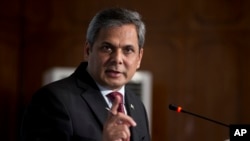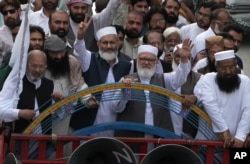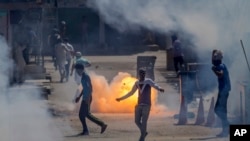Pakistan has criticized the United States for designating Hizbul Mujahideen, the largest militant group fighting Indian rule in the disputed Kashmir region, as a “foreign terrorist” organization.
Foreign Ministry spokesman Nafees Zakaria told reporters Thursday that Islamabad is “disappointed” at the U.S. decision. He said that Kashmir is an internationally recognized territorial dispute between Pakistan and India, and there have been U.N. Security Council resolutions pending implementation for decades.
“The 70-year-old indigenous struggle of Kashmiris in Indian occupied Jammu and Kashmir remains legitimate. The designation of individuals or groups supporting the Kashmiris’ right to self-determination as terrorist is completely unjustified,” Zakaria said.
The U.S. State Department added Hizbul Mujahideen to its list of global “terrorist” organizations on Wednesday, saying the action is a bid to deny the group “the resources it needs to carry out terrorist attacks.” It said the group has claimed responsibility for several attacks, including a bombing in Kashmir more than two years ago that injured 17 people.
The designation blocks any assets Hizbul Mujahideen may have under U.S. jurisdiction and prohibits Americans from doing business with it.
Several hundred supporters of the group took to the streets Thursday in Muzafarabad, the central town of the Pakistan-administered portion of Kashmir, to denounce the U.S. decision.
A prominent separatist leader in Indian Kashmir, Mirwaiz Umar Farooq, expressed his disappointment at the U.S. decision, saying militant groups fighting Indian occupation should not be called terrorists.
“They are not global terrorist organizations who are attacking targets outside Kashmir or killing innocent people. Kashmir is an international dispute and we are seeking its resolution international pledges. But India is not ready to resolve this issue peacefully and is prolonging it,” Farooq told the VOA Urdu service.
Hizbul Mujahideen was established in 1989. Its Pakistan-based founder, Syed Salahuddin, was designated a global “terrorist” by the U.S. in June. The militant leader swiftly denounced and rejected the action, vowing to continue fighting until India quits Kashmir.
Both Islamabad and New Delhi claim the region in its entirety and have fought two full-scale wars over the divided Himalayan region. It remains the primary source of bilateral tensions, with military clashes routinely taking place along the cease-fire line, or the Kashmir Line of Control.
India has been struggling to restore normalcy and suppress a new wave of protests that has gripped the two-thirds of Kashmir under its control since July 2016 when Indian security forces, in an encounter, killed 22-year-old Burhan Wani, a popular commander of Hizbul Mujahideen.
Human rights groups have since accused Indian security forces of using brutal force in their bid to disperse stone-throwing crowds taking to the streets almost every day, and prompting authorities to occasionally impose a curfew and other restrictions.
Scores of people have died in clashes with security forces in the last year and thousands more have been wounded, deepening anti-India sentiment in Kashmir, where support is reportedly growing for armed fighters among the youth.
India accuses Pakistan of supporting and arming Kashmiri separatists, a charge denied by Islamabad.












